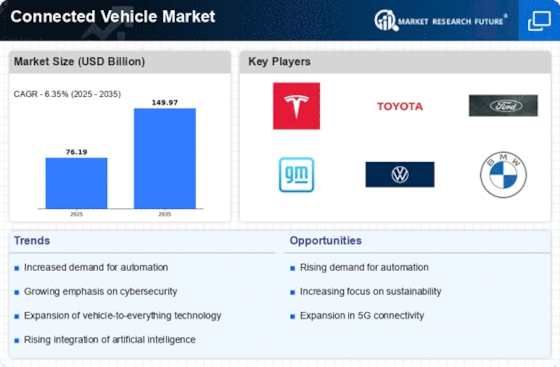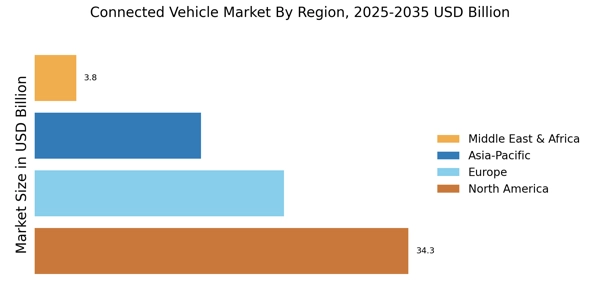Growing Adoption of Electric Vehicles
The Connected Vehicle Market is witnessing a growing adoption of electric vehicles (EVs), which are increasingly equipped with connected technologies. As environmental concerns rise, consumers are gravitating towards EVs that offer not only sustainability but also advanced connectivity features. Data indicates that the EV market is expected to surpass 800 billion dollars by 2027, suggesting a substantial shift in consumer preferences. This trend is further supported by government incentives and regulations aimed at reducing carbon emissions. The integration of connected technologies in EVs enhances user experience through features such as real-time charging station availability and remote vehicle monitoring, thereby driving growth in the Connected Vehicle Market.
Rising Demand for Enhanced Safety Features
The Connected Vehicle Market experiences a notable surge in demand for enhanced safety features. Consumers increasingly prioritize advanced driver-assistance systems (ADAS) that utilize connected technologies to improve road safety. According to recent data, the market for ADAS is projected to reach approximately 60 billion dollars by 2026, indicating a robust growth trajectory. This demand is driven by a growing awareness of road safety and the potential for connected vehicles to reduce accidents through features such as automatic emergency braking and lane-keeping assistance. As manufacturers integrate these technologies, the Connected Vehicle Market is likely to witness a significant transformation, with safety becoming a central selling point for new vehicles.
Increased Investment in Smart Infrastructure
The Connected Vehicle Market is positively impacted by increased investment in smart infrastructure. Governments and private entities are recognizing the importance of developing infrastructure that supports connected vehicle technologies. Investments in smart traffic signals, connected roadways, and vehicle-to-infrastructure (V2I) communication systems are on the rise. This trend is expected to facilitate smoother traffic flow and enhance safety, thereby encouraging the adoption of connected vehicles. Reports indicate that smart infrastructure investments could reach 1 trillion dollars by 2030, underscoring the potential for a more integrated transportation ecosystem. As infrastructure evolves, the Connected Vehicle Market is likely to benefit from enhanced connectivity and improved user experiences.
Advancements in Autonomous Driving Technologies
The Connected Vehicle Market is significantly influenced by advancements in autonomous driving technologies. As automakers invest heavily in research and development, the integration of connected systems with autonomous capabilities is becoming more prevalent. Reports suggest that the autonomous vehicle market could reach 557 billion dollars by 2026, highlighting the potential for connected vehicles to revolutionize transportation. These advancements not only promise to enhance convenience but also aim to improve traffic efficiency and reduce congestion. The synergy between connected vehicle technologies and autonomous driving is likely to reshape the landscape of the automotive industry, making it a pivotal driver in the Connected Vehicle Market.
Emergence of Mobility-as-a-Service (MaaS) Solutions
The Connected Vehicle Market is experiencing a shift with the emergence of Mobility-as-a-Service (MaaS) solutions. These services integrate various forms of transportation into a single accessible platform, promoting the use of connected vehicles as part of a broader mobility ecosystem. The MaaS market is projected to grow significantly, potentially reaching 300 billion dollars by 2030. This growth is driven by urbanization and the need for efficient transportation solutions. As consumers increasingly seek convenience and flexibility, connected vehicles play a crucial role in this transition, offering features that align with MaaS objectives. The rise of MaaS is likely to reshape the Connected Vehicle Market, fostering collaboration among various stakeholders.

















